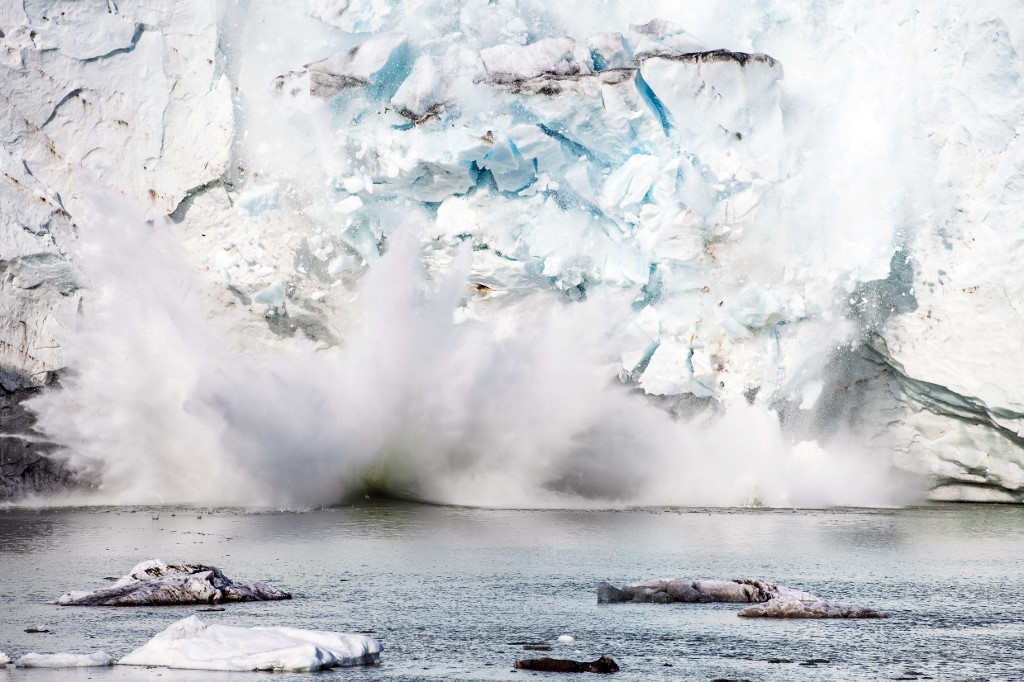Popular Reads
Top Results
Can't find what you're looking for?
View all search resultsPopular Reads
Top Results
Can't find what you're looking for?
View all search resultsGreenland ice melting past 'tipping point': Study
The melting of Greenland's ice cap has gone so far that it is now irreversible, with snowfall no longer able to compensate for the loss of ice even if global warming were to end today.
Change text size
Gift Premium Articles
to Anyone
 This file photo taken on August 17, 2019 shows an iceberg calving with a mass of ice breaking away from the Apusiajik glacier, near Kulusuk (aslo spelled Qulusuk), a settlement in the Sermersooq municipality located on the island of the same name on the southeastern shore of Greenland. / AFP (AFP/Jonathan Nackstrand )
This file photo taken on August 17, 2019 shows an iceberg calving with a mass of ice breaking away from the Apusiajik glacier, near Kulusuk (aslo spelled Qulusuk), a settlement in the Sermersooq municipality located on the island of the same name on the southeastern shore of Greenland. / AFP (AFP/Jonathan Nackstrand )
T
he melting of Greenland's ice cap has gone so far that it is now irreversible, with snowfall no longer able to compensate for the loss of ice even if global warming were to end today, according to researchers.
"Greenland's glaciers have passed a tipping point of sorts, where the snowfall that replenishes the ice sheet each year cannot keep up with the ice that is flowing into the ocean from glaciers," said a statement from Ohio State University, where several authors of a study published August 13 in Communications Earth and Environment are based.
Climate change is having a devastating effect on the world's glaciers, with the ice melt posing a threat to millions of people around the world.
Alarming reports about the ice melt on the vast Arctic island -- which is warming twice as fast as the rest of the planet -- have multiplied in recent years.
Eighty-five percent of the surface of Greenland, an island of two million square kilometers or four times the size of France, is covered in ice.
"The study confirms results from a lot of other studies ... that the combination of melt and calving of icebergs explains the large amount of ice lost from Greenland over the last couple of decades," Ruth Mottram, a climatologist at Denmark's Meteorological Institute told AFP.
In the 1980s and 1990s, the ice cap lost around 450 billion tonnes of ice per year, which was compensated by snowfall, the scientists said after analyzing 40 years of data.
But the ice melt has accelerated this century, climbing to 500 billion tonnes and it is no longer sufficiently replenished with snow.
"The Greenland ice sheet is losing mass at accelerated rates in the 21st century, making it the largest single contributor to rising sea levels," the study said.
The melting ice actually causes more ice to melt, as the meltwater that collects on the ice sheet absorbs more of the Sun's radiative force than snow and ice do -- snow and ice reflect sunlight back into space.
In addition, the loss of ice exposes the permafrost, or frozen soil, which when thawed releases powerful greenhouse gases into the atmosphere, trapping heat.
Therefore the melting ice is not just a symptom of global warming, it is also becoming a driver of global warming.
Read also: Siberian heatwave, early Greenland ice melt worry researchers
Tipping point debate
While researchers are in agreement that the Greenland ice melt is worrying, not all agree that it has reached a 'tipping point'.
"We don't know how much greenhouse gas concentrations will rise," Mottram said.
The published results show that "even if we stabilized temperatures (and greenhouse gas emissions) at the present level, the ice sheet would still continue to melt, but only until the size of the ice sheet is once more in balance with the climate," she said.
As the ice sheet is rapidly losing mass in contact with the ocean, once the ice loses contact with the water the massive ice discharge will stop.
Meanwhile, a recent study from Britain's University of Lincoln concluded that Greenland's ice melt alone is expected to contribute 10-12 centimeters to the world's rising sea levels by 2100.
The UN's IPCC climate science advisory panel said in 2013 it expected sea levels to rise 60 centimeters by the end of the century.










